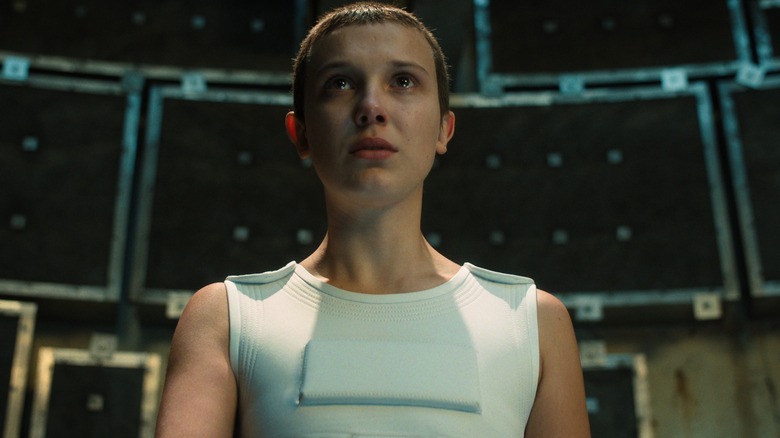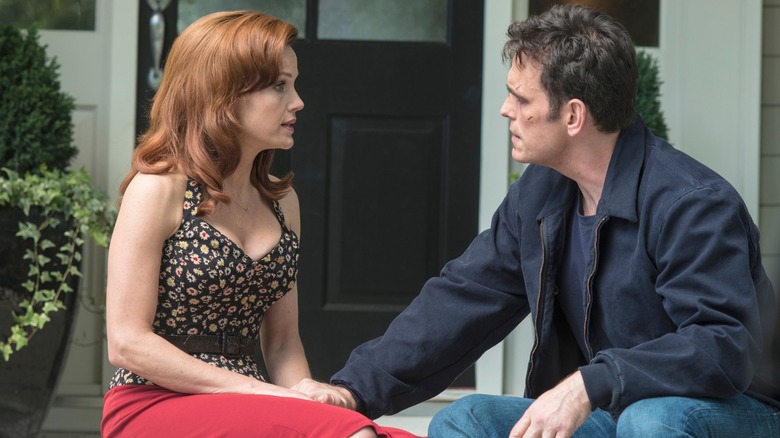M. Night Shyamalan's Underrated TV Show Was A Launch Pad For Stranger Things
Years before Matt and Ross Duffer found unprecedented global success with Netflix's "Stranger Things," the filmmaking duo kicked off their career with an overlooked post-apocalyptic horror. This debut title, "Hidden," received an extremely limited release in 2015 and fewer critical reviews, but showed great promise as an atypical genre entry that oozed creativity. The same year afforded the Duffer Brothers a solid chance to showcase their talents, as they were hired as writers/producers for a Fox series adaptation of Blake Crouch's "Wayward Pines" book trilogy. This was admittedly a big deal — the eponymous show's twisty pilot was helmed by M. Night Shyamalan, and subsequent episodes were directed by the likes of Ti West, Vincenzo Natali, and James Foley (among others).
Crouch's trilogy begins with US Secret Service agent Ethan Burke (Matt Dillon in the series) waking up in a strange small town with transient amnesia. This town, Wayward Pines, doesn't provide him much comfort in his disoriented state, as this picturesque paradise emits an aura so ominous that Burke's instincts are unable to ignore this gnawing sentiment. With his memory gone, he's unable to piece together his own identity, which is exacerbated by the fact that the townsfolk resent him for some reason. As time passes, things start feeling more off than ever before: nobody seems to be looking for him, there are hardly any cars on the roads, and a huge electrified fence creates a perimeter around Wayward Pines.
I wouldn't be surprised if you're already drawing parallels to David Lynch's "Twin Peaks," even though the Fox series feels distinctly different than its obvious tonal inspiration. But "Wayward Pines" establishes its identity well enough. And a line can be drawn directly from "Wayward Pines" to "Stranger Things."
Wayward Pines is crucial to the Duffer Brothers' grasp on making great television
The Duffer Brothers wrote four episodes for the show's first season, and they even penned the season finale alongside Crouch and showrunner Chad Hodge. The writing in season 1 is consistently promising, as it successfully presents the titular town as a sinister force and its inhabitants as evolving mysteries that Burke needs to unravel to gauge the bigger picture. There's some real tension and mystery here, and you might even be tempted to make stylistic comparisons to "Lost" and "The Returned" (which isn't a bad thing at all). In case you're curious about specific Duffer-helmed episodes, I would recommend the season 1 finale, along with "The Reckoning," which reveals the show's central mystery in a well-paced and satisfying fashion.
Although "Wayward Pines" didn't receive exceptional ratings, the series is worth watching despite a weaker second season that sports repetitive themes and predictable writing. But the first season alone boasts a ton of likable traits: It borrows heavily from similar stories but manages to keep things exciting, while also succeeding in selling a twist that you saw coming a mile off. A great episode emblematic of these qualities is yet another Duffer Brothers banger, namely "The Truth," which justifies every misdirection thrown at us and demonstrates the fantastic inner workings of a well-earned twist. The fact that your working theories are proven right doesn't detract from the experience at all — if anything, it enhances the thrill, while still succeeding in throwing a few narrative curveballs at you.
"Hidden" might've put the Duffer Brothers on the map, but "Wayward Pines" gave them the necessary springboard to conceive something as ambitious as "Stranger Things." All in all, their commendable contributions to the series undoubtedly deserve newfound appreciation.

